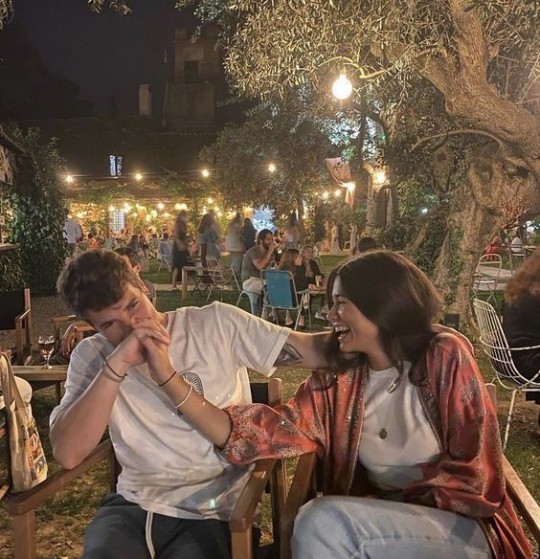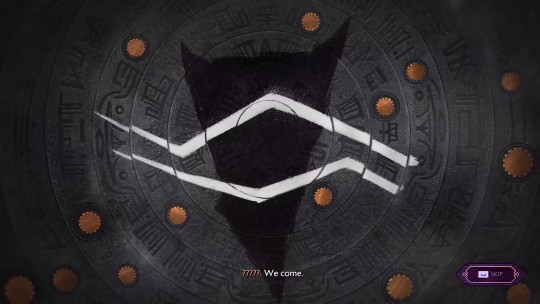#Individual Circumstances review
Explore tagged Tumblr posts
Text

My Honest Opinion:
This is your evergreen "black cat and golden retriever" trope. It hands down is one of my favourite series.

Well, despite of it being one of my favourite series, I must admit that it was getting a bit over the top from time to time. I mean, I get it that it that the misunderstandings were pretty rough but damn, this is why you must communicate and be considerate.

But all's well that ends well. Hence I am glad that everything went well between them and eventually we got the happy ending that we were longing for. So, I definitely recommend watching this series.
#gayaf#gaylove#boys like boys#gayness#gay#gayboy#gay series#gayfiction#bl series#bl review#bl recommendation#bl romance#bl rp#korean bl#korean#south korea#bl kdrama#individual circumstances
6 notes
·
View notes
Text
Best Boy Love Stories (BLs) of 2023 January Edition
This year, 2023, the BL world has enjoyed a massive premier of bl series especially from Japan, Korea, and ofcourse Thailand. Some of these series have been really good, others not quite, and others just bottom line frustrating. Regardless, it has quite a treat to watch the BL series push the boundaries to give the fans innovative storylines beyond first love and coming out stories to healing…

View On WordPress
#2023Bls#Bl Series#bl series January 2023#blseries Thaibls#cutie pie#Hit Bite Love#individual circumstances#JapaneseBls#koreanbls#Series reviews#the end of the world with you#watchlist#zerotohero
0 notes
Text
Moon in Houses of Union(1585) Persona Chart


Other related post you might like:
Sun in houses of Union persona chart
Astro observation 1
Astro observation 2
---------------------------------★
Groom Persona Chart
Sun
Moon
Mercury
Venus
Mars
Pluto
---------------------------------★
Synastry/Composite Chart Observations 1
Review of my readings-1
🪄🪄🪄🪄🪄🪄🪄🪄🪄🪄🪄🪄🪄🪄🪄🪄
[PS: These are my personal observations. For entertainment purpose only. Have fun💚.]
~℅~~℅~~~℅~~~~℅~~~~~℅~~~~~~℅~~~~~~~℅


[In the Union asteroid persona chart, the Moon represents the emotional essence of partnerships and the subconscious connection within unions.
Moon in houses of the Union persona chart may be used to derive insights about emotional dynamics in relationships and clues about the circumstances under which they might meet their future spouse.]
Moon in the 1st House
This placement suggests emotional vulnerability and sensitivity in partnerships. They can only find a mate in circumstances that give full vent to their feelings-such as during a screaming argument or some kind of melodrama. The spouse would be caretaking, empathetic, and the marriage would revolve around understanding and emotional growth. The relationship may begin with an intuitive sense of "home" or comfort, and they may meet in a personal or intimate setting where authenticity is valued.
Moon in the 2nd House
This placement indicates that emotional security and shared values are crucial. They may find their partner in places associated with finances, like a bank, marketplace, or some workshop on wealth management. The spouse will offer emotional and material stability, and the relationship will be oriented toward the establishment of a safe, harmonious life together. The emotional connection will be fostered while building shared resources or working on mutual financial aspirations.
Moon in the 3rd House
With the Moon here, emotional connection through communication is what works. They could meet their future spouse during a casual conversation, at a local event, or through shared intellectual pursuits. The relationship will thrive on frequent emotional exchanges, and the spouse may be a good listener or someone who values deep discussions. Their union will focus on sharing ideas and emotional intelligence, potentially blossoming in environments like a book club, workshop, or neighborhood gathering.


Moon in the 4th House
This is a profoundly nurturing placement, suggesting that they will meet their spouse through family, in the home, or in some setting connected with their roots. The relationship will be emotionally secure, with its basis in the creating of family or sanctuary together. The spouse may be very connected with tradition or home life and offer emotional safety. They might meet during a family gathering, while visiting a hometown, or in a context where emotional intimacy is encouraged.
Moon in the 5th House
Moon: The Moon here suggests that one might meet their spouse through a joyful, creative, or romantic setting. They can be met at a party, theatre, or while enjoying hobbies they love. The relationship will emotionally be exciting and stimulating since both partners will be highly appreciative of creativity and passion. The spouse can also be an emotionally exciting individual who brings spontaneity to the individual's life, and they focus on enjoying life's pleasures together.
Moon in the 6th House
This placement emphasizes service and routine. They might meet their spouse in a work environment, at a health-related event, or while helping others. The spouse may be someone who is emotionally supportive in practical ways, like managing daily responsibilities or offering help when needed. The union will be grounded in mutual service and care, creating an emotionally fulfilling partnership built on reliability and shared goals.
Moon in the 7th House
Here, the Moon denotes an emotional and well-balanced partnership. They might get a life partner in a very formal atmosphere, such as during a business deal, some legal formality, or an arranged marriage. The spouse will be emotionally obliging and believe in the principle of equality between the two partners. The relationship will be harmonious as both partners will fulfill the emotional needs of each other. They may feel instant emotional rapport when they come across their spouse.
Moon in the 8th House
This is a very emotional and intense placement-a real transformative placement. They might meet their spouse when some transformative life event is occurring or be in some sort of setting related to shared resources or deep emotional work, like counseling or spiritual retreats. The spouse will have a mysterious, magnetic quality and give them emotional healing and growth. Their relationship will explore deep emotional bonds, intimacy, and shared vulnerabilities.


Moon in the 9th House
Here, emotional fulfillment comes through exploration and learning. They might meet their future spouse while traveling, studying, or in discussions on philosophy or spirituality. The spouse will more than likely be the adventurous type and inspire emotional growth. Together, they will explore new horizons, with the union focusing on expanding their emotional and intellectual perspectives.
Moon in the 10th House
This placement may indicate that they are going to meet their partner at work or through a public life. The spouse is there for emotional support in pursuit of professional goals and realization of ambition. The relationship would therefore, be emotionally satisfying, considering the shared goals and objectives that receive public applause. They could meet while attending a conference, at functions related to work, or at important junctures in their life.
Moon in the 11th House
The Moon here indicates friendship and shared dreams as means of establishing emotional connection. They could meet their spouse through social groups, a mutual friend, or while working on a cause or project. The spouse will likely share their ideals and aspirations, creating a union focused on building a shared vision for the future. They may find emotional bonding on humanitarian services or group activities.
Moon in the 12th House
This placement of Moon suggests a deeply spiritual and private connection. They can find their spouse in some secluded, healing, mystical settings, retreats, hospitals, or spiritual communities. The spouse may heal them emotionally, and the union will focus on unconditional love and empathy. Their relationship might involve overcoming subconscious fears and establishing soulful levels of trust.
{The Moon's aspects with other planets in the Union persona chart will further define these interpretations and show other emotional dynamics, as well as the nature of the influence a future spouse might have.}
#astro community#astro observations#astrology#astro notes#persona chart#birth chart#horoscope#synastry#union persona chart#union
370 notes
·
View notes
Text
AI’s “human in the loop” isn’t

I'll be in TUCSON, AZ from November 8-10: I'm the GUEST OF HONOR at the TUSCON SCIENCE FICTION CONVENTION.

AI's ability to make – or assist with – important decisions is fraught: on the one hand, AI can often classify things very well, at a speed and scale that outstrips the ability of any reasonably resourced group of humans. On the other hand, AI is sometimes very wrong, in ways that can be terribly harmful.
Bureaucracies and the AI pitchmen who hope to sell them algorithms are very excited about the cost-savings they could realize if algorithms could be turned loose on thorny, labor-intensive processes. Some of these are relatively low-stakes and make for an easy call: Brewster Kahle recently told me about the Internet Archive's project to scan a ton of journals on microfiche they bought as a library discard. It's pretty easy to have a high-res scanner auto-detect the positions of each page on the fiche and to run the text through OCR, but a human would still need to go through all those pages, marking the first and last page of each journal and identifying the table of contents and indexing it to the scanned pages. This is something AI apparently does very well, and instead of scrolling through endless pages, the Archive's human operator now just checks whether the first/last/index pages the AI identified are the right ones. A project that could have taken years is being tackled with never-seen swiftness.
The operator checking those fiche indices is something AI people like to call a "human in the loop" – a human operator who assesses each judgment made by the AI and overrides it should the AI have made a mistake. "Humans in the loop" present a tantalizing solution to algorithmic misfires, bias, and unexpected errors, and so "we'll put a human in the loop" is the cure-all response to any objection to putting an imperfect AI in charge of a high-stakes application.
But it's not just AIs that are imperfect. Humans are wildly imperfect, and one thing they turn out to be very bad at is supervising AIs. In a 2022 paper for Computer Law & Security Review, the mathematician and public policy expert Ben Green investigates the empirical limits on human oversight of algorithms:
https://papers.ssrn.com/sol3/papers.cfm?abstract_id=3921216
Green situates public sector algorithms as the latest salvo in an age-old battle in public enforcement. Bureaucracies have two conflicting, irreconcilable imperatives: on the one hand, they want to be fair, and treat everyone the same. On the other hand, they want to exercise discretion, and take account of individual circumstances when administering justice. There's no way to do both of these things at the same time, obviously.
But algorithmic decision tools, overseen by humans, seem to hold out the possibility of doing the impossible and having both objective fairness and subjective discretion. Because it is grounded in computable mathematics, an algorithm is said to be "objective": given two equivalent reports of a parent who may be neglectful, the algorithm will make the same recommendation as to whether to take their children away. But because those recommendations are then reviewed by a human in the loop, there's a chance to take account of special circumstances that the algorithm missed. Finally, a cake that can be both had, and eaten!
For the paper, Green reviewed a long list of policies – local, national, and supra-national – for putting humans in the loop and found several common ways of mandating human oversight of AI.
First, policies specify that algorithms must have human oversight. Many jurisdictions set out long lists of decisions that must be reviewed by human beings, banning "fire and forget" systems that chug along in the background, blithely making consequential decisions without anyone ever reviewing them.
Second, policies specify that humans can exercise discretion when they override the AI. They aren't just there to catch instances in which the AI misinterprets a rule, but rather to apply human judgment to the rules' applications.
Next, policies require human oversight to be "meaningful" – to be more than a rubber stamp. For high-stakes decisions, a human has to do a thorough review of the AI's inputs and output before greenlighting it.
Finally, policies specify that humans can override the AI. This is key: we've all encountered instances in which "computer says no" and the hapless person operating the computer just shrugs their shoulders apologetically. Nothing I can do, sorry!
All of this sounds good, but unfortunately, it doesn't work. The question of how humans in the loop actually behave has been thoroughly studied, published in peer-reviewed, reputable journals, and replicated by other researchers. The measures for using humans to prevent algorithmic harms represent theories, and those theories are testable, and they have been tested, and they are wrong.
For example, people (including experts) are highly susceptible to "automation bias." They defer to automated systems, even when those systems produce outputs that conflict with their own expert experience and knowledge. A study of London cops found that they "overwhelmingly overestimated the credibility" of facial recognition and assessed its accuracy at 300% better than its actual performance.
Experts who are put in charge of overseeing an automated system get out of practice, because they no longer engage in the routine steps that lead up to the conclusion. Presented with conclusions, rather than problems to solve, experts lose the facility and familiarity with how all the factors that need to be weighed to produce a conclusion fit together. Far from being the easiest step of coming to a decision, reviewing the final step of that decision without doing the underlying work can be much harder to do reliably.
Worse: when algorithms are made "transparent" by presenting their chain of reasoning to expert reviewers, those reviewers become more deferential to the algorithm's conclusion, not less – after all, now the expert has to review not just one final conclusion, but several sub-conclusions.
Even worse: when humans do exercise discretion to override an algorithm, it's often to inject the very bias that the algorithm is there to prevent. Sure, the algorithm might give the same recommendation about two similar parents who are facing having their children taken away, but the judge who reviews the recommendations is more likely to override it for a white parent than for a Black one.
Humans in the loop experience "a diminished sense of control, responsibility, and moral agency." That means that they feel less able to override an algorithm – and they feel less morally culpable when they sit by and let the algorithm do its thing.
All of these effects are persistent even when people know about them, are trained to avoid them, and are given explicit instructions to do so. Remember, the whole reason to introduce AI is because of human imperfection. Designing an AI to correct human imperfection that only works when its human overseer is perfect produces predictably bad outcomes.
As Green writes, putting an AI in charge of a high-stakes decision, and using humans in the loop to prevent its harms, produces a "perverse effect": "alleviating scrutiny of government algorithms without actually addressing the underlying concerns." The human in the loop creates "a false sense of security" that sees algorithms deployed for high-stakes domains, and it shifts the responsibility for algorithmic failures to the human, creating what Dan Davies calls an "accountability sink":
https://profilebooks.com/work/the-unaccountability-machine/
The human in the loop is a false promise, a "salve that enables governments to obtain the benefits of algorithms without incurring the associated harms."
So why are we still talking about how AI is going to replace government and corporate bureaucracies, making decisions at machine speed, overseen by humans in the loop?
Well, what if the accountability sink is a feature and not a bug. What if governments, under enormous pressure to cut costs, figure out how to also cut corners, at the expense of people with very little social capital, and blame it all on human operators? The operators become, in the phrase of Madeleine Clare Elish, "moral crumple zones":
https://estsjournal.org/index.php/ests/article/view/260
As Green writes:
The emphasis on human oversight as a protective mechanism allows governments and vendors to have it both ways: they can promote an algorithm by proclaiming how its capabilities exceed those of humans, while simultaneously defending the algorithm and those responsible for it from scrutiny by pointing to the security (supposedly) provided by human oversight.

Tor Books as just published two new, free LITTLE BROTHER stories: VIGILANT, about creepy surveillance in distance education; and SPILL, about oil pipelines and indigenous landback.


If you'd like an essay-formatted version of this post to read or share, here's a link to it on pluralistic.net, my surveillance-free, ad-free, tracker-free blog:
https://pluralistic.net/2024/10/30/a-neck-in-a-noose/#is-also-a-human-in-the-loop

Image: Cryteria (modified) https://commons.wikimedia.org/wiki/File:HAL9000.svg
CC BY 3.0 https://creativecommons.org/licenses/by/3.0/deed.en ==
290 notes
·
View notes
Text
Writing Notes: Vividness Bias

Vividness Bias - the inclination to make decisions based on distinguished characteristics rather than the situation as a whole.
Overweighting factors that appear prestigious causes individuals to overlook other elements that are equally important.
A common example of vividness bias is choosing a job solely based on the starting salary without considering other key components, such as the commute or company culture.
How to Identify Vividness Bias
To identify the vividness effect, follow the below steps.
Assess the situation. Review the decision or problem you’re trying to solve, focusing on how the situation impacts all stakeholders. Outline the main objectives of the circumstances along with the necessary steps you need to take to understand the different factors. Evaluating the situation with fresh eyes will help you determine whether you’re approaching the position with a balanced or skewed perspective.
Reflect on the factors influencing you. If you employ vividness bias to analyze a situation, you overemphasize flashy pieces of information. Consider the factors most influencing your decision-making, and identify whether those factors are prestigious stimuli. This type of psychological review will help you sift through vivid information and prevent you from discounting pallid factors as an incentive.
Recognize your bias. After highlighting the factors you’re most drawn to, ask yourself why you’re focusing on those influences. With this form of reflection, you can determine your vividness bias and avoid making additional mental shortcuts that hinder you from reaching a sound decision. Using this type of reflection will also help limit your cognitive bias, which is another thought process that can hinder your decision-making.
How to Combat Vividness Bias
Understanding cognitive psychology can help you keep your confirmation bias in check, helping you make informed decisions that avoid the vividness effect.
Outline your priorities. Identify what you value most, so you can avoid becoming enticed by vivid factors. For example, if you’re completing a job questionnaire, reflect on each element of the position and organize them in order of importance. While the salary negotiations may appear to be the most important factor, the job location may be another component your vividness bias leads you to overlook. Outlining your priorities and focusing on your values will help you combat vividness bias.
Review the situation from different perspectives. It’s a common human behavior to rely on availability bias to draw information and make decisions. However, using the most accessible information to make a decision can cause you to give in to the vividness effect. Instead, evaluate the situation from multiple perspectives, so you can determine different trade-offs that may be beneficial to you. Considering a situation from multiple perspectives is also an effective strategy for developing an open mind.
Avoid unrealistic comparisons. Vividness bias can lead you to make unrealistic comparisons. These types of contrasts, known as salience bias, can hinder your decision-making and lower your self-esteem. If you catch yourself comparing your situation to another circumstance, take a moment to stop and reflect. Limiting your daily comparisons will help you focus on the present situation, allowing you to use rational thinking to approach a solution.
Make an informed decision. After considering each factor, you can reach a conclusion that best fits your needs and values. Focusing on your main priorities and avoiding comparison will help you combat the effects of vividness bias.
Vividness bias can shield rational thinking during important decision-making or problem-solving situations.
When negotiating a deal, vividness bias causes decision makers to neglect important aspects of the circumstances.
From a collaboration standpoint, team members tend to emphasize their strengths and miscalculate their weaknesses, which can result in conflict escalation.
Developing an awareness when it comes to vividness bias can help you cooperate more effectively in a team environment and make informed decisions.
Source ⚜ More: Notes & References ⚜ Writing Resources PDFs
#writing notes#character development#writeblr#relationship#writing inspiration#character building#writing ideas#light academia#writers on tumblr#writing reference#literature#spilled ink#dark academia#writing prompt#creative writing#writing resources
109 notes
·
View notes
Text
This should not have taken so long
Trans women who have hurt or threatened women or girls will not be held in female prisons unless there are "exceptional" circumstances, new guidance states.
The Scottish Prison Service (SPS) policy follows a public outcry after a rapist was sent to a women's prison.
Isla Bryson raped two women while known as Adam Graham.
The Scottish Conservatives said the new policy was "subjective" and "unacceptable".
The latest figures show there were 23 trans prisoners in Scotland from January to March this year.
They included 19 trans women, seven of whom were in a women's prison, and four trans men - one of whom was in a male prison.
Under previous guidance drawn up in 2014, the prison service allowed prisoners to be placed in facilities matching their gender identity, rather than their sex at birth, providing accommodation that "best suits the person in custody's needs".
This was reviewed and in February, following the Bryson case, it was updated to say no newly convicted or remanded transgender prisoner with a history of violence against women would be housed in female prison facilities.
Under the new policy - which will come into force in February 2024 - a trans woman would not be allowed to move into the female estate if they had been convicted of, or were on remand awaiting trial for, a crime that harmed a female - unless there was "compelling evidence that they did not present an unacceptable risk of harm to those in the women's prison".
These offences include any that result in suffering to a female, such as sexual offences, murder, assault, abduction and intimidation.
Those who have changed their legal gender can also be housed in accordance with their sex at birth, "if it is considered necessary to support people's safety and wellbeing".
The policy states: "Only when staff have enough information to reach a decision that a trans individual can be safely accommodated will they be placed in an establishment which matches their affirmed gender."
Trans men will be admitted to the female estate, but those who have committed crimes against women may be kept separate from other prisoners if it is "deemed necessary" to "keep women in custody safe".
The new guidelines also allow officers to search inmates regardless of the inmate's "affirmed gender" or sex assigned at birth, "if it is necessary to keep the individual or staff safe".
Risks carefully managed'
Teresa Medhurst, chief executive of the Scottish Prison Service, said if a trans woman's offences were historic and low level, they could be moved to the female estate, but she stressed that would be exceptional.
She said all prisoners were "treated with dignity and respect, with their rights upheld, and any risks carefully managed".
"The position, whilst it is still individualised, will ensure that those that have a history of violence against women and girls and present a risk to women will no longer be placed on admission in the women's estate.
"I am content that everyone who is a transgender individual is located in the prison which best suits their risk and needs profile."
She added that she was confident the new policy would address public concerns surrounding trans prisoners.

The Scottish government's Justice Secretary Angela Constance said the new policy protected the "safety and welfare" of staff and prisoners, and the "rights of transgender people".
She said: "SPS has considerable expertise, as well as a duty of care for the management of people in their custody, and this policy upholds its responsibilities to deliver safe, secure and suitable services for all."
Scottish Conservative justice spokesman Russell Findlay MSP said the new prison policy was "unacceptable" and put women at "even greater risk by further eroding their fundamental right to single-sex space".
"They say that male prisoners with a history of violence against women or girls should be allowed in the female estate and will only be blocked if they present a risk, which is completely subjective."
Lucy Hunter Blackman, from policy analysts Murray Blackburn Mackenzie, said any new policy in Scotland should not "talk narrowly about the potential risk of a physical or sexual assault".
She added: "It needs to recognise how the presence of someone male might impact upon group of vulnerable traumatised women, held in spaces from which they cannot escape."
498 notes
·
View notes
Text
MorphoSkin Industries
"Slip Into a New You"
About Us
MorphoSkin Industries is the world’s leading provider of high-quality, hyper-realistic male body suits designed for full-body transformation. Our proprietary BioFlex™ SkinTech replicates human texture, warmth, and even biometric feedback to create the most immersive transformation experience possible. Whether you’re looking to embody a new persona, explore a different life, or simply indulge in your deepest fantasies, MorphoSkin has the perfect fit for you.
Our Product Line
Standard Series – Affordable and flexible suits for casual use.
Deluxe Identity Series – Custom-molded suits based on real individuals (with consent, of course).
Immersion X – Advanced models featuring heartbeat synchronization, voice modulation, and scent adaptation.
Legacy Line – Limited edition historical figures for those who want to become the past.

"Great product 5 stars"
(DM me if you want to write your review/ storys of using MorphoSkin and leave your reviews below) ;)
Terms & Conditions
By purchasing and using a MorphoSkin suit, you agree to the following:
1. You must be 18 years or older to order.
2. Suits are for personal recreational use only—any attempts at fraudulent impersonation are strictly prohibited.
3. Do not expose the suit to extreme heat or open flames (unless you want to melt into your new identity).
4. Once fully merged with a suit, removal may require our patented Reversal Agent™. We are not responsible for permanent transformations.
5. Under no circumstances should you wear a MorphoSkin suit for longer than 72 hours continuously—extended use may cause... unexpected side effects.
Warning: Things You Should NEVER Do While Wearing a MorphoSkin Suit
-Don’t Sleep in It for Too Long
-Do Not Let Someone Else Wear Your Suit
-Don’t Ignore the Itch
89 notes
·
View notes
Text
A pointless, overly long, barely edited review of White Fragility
Well that book sucked.
The end I guess.
OK honestly the process of reading White Fragility was incredibly draining, I started out annoyed, then became amused and fascinated by Robin DiAngelo’s peculiar definition of “Individualism”, then got annoyed and angry again, then just… drained. It’s an exhausting book.
As I try to put my feelings out there I’m having trouble linking them together coherently but this book is just so exhausting that the idea of editing this and doing several passes is just draining to think about. So here are some scattered thoughts:
Before anything else, it’s just not well written or edited
White Fragility is very repetitive, ambling, and just kind of�� not very well arranged in general. It’s clear that the book desperately needed a proper editor, or maybe it didn’t, since it became incredibly successful despite everything wrong with it. Here’s an example I’ve already mentioned.
Towards the end of the first part of the book, DiAngelo puts together a list of a “common set of racial patterns” that are “the foundation of white fragility” and one of the bullets on that list reads,
“Wanting to jump over the hard, personal work and get to ‘solutions’”
Not once, anywhere in the preceding 111 pages or the succeeding 128 is the idea expanded on in any way whatsoever.
And it’s a truly baffling statement if you don’t expand on it. Why are solutions somehow opposed to “hard, personal work”? Is hard, personal work not part of a solution to some problem? If not why are we doing it?
The whole book has a similarly sloppy vibe; there’s very little factual information inside and what ideas there are are explained very badly.
A Christian apology for non-Christians
The more I read of White Fragility the more it seemed to me to have in common with badly written Christian apologia.
First off, modern, right-wing American Christian religious material often contains a sort of confusion that anybody could respond badly to the Gospels. After all, the good news of Jesus’ sacrifice and resurrection is both obviously factually true AND self-evidently good news, but somehow when you go out and preach the gospels, non-believers will often act with derision or anger.
And there is a certain kind of Christian who will respond to that anger, not by considering that there might be factual or moral objections to the gospel, but by essentially asking, “What kind of bizarre psychological condition would cause somebody to get angry about something that is obviously true and obviously good?”
This is an ongoing thread in DiAngelo’s writing, starting with the introduction,
“In the early days of my work as what was then termed a diversity trainer, I was taken aback by how angry and defensive so many white people became at the suggestion that they were connected to racism in any way…
“I couldn’t understand their resentment or disinterest in learning more about such a complex social dynamic as racism. These reactions were especially perplexing when there were few or no people of color in their workplace, and they had the opportunity to learn from my cofacilitators(sic) of color. I assumed that in these circumstances, an educational workshop on racism would be appreciated. After all, didn’t the lack of diversity indicate a problem or at least suggest some perspectives were missing?”
Well gosh, why wouldn’t these people be excited to hear about all the things they’ve been doing wrong? Truly a mystery.
Secondly, most of the arguments DiAngelo makes are made very sloppily, and are only really convincing if you have already been well-convinced. To demonstrate this I would essentially have to just quote the whole book to you, but for an example see the bit above about wanting to jump over hard personal work. You and I have spent too much time in the fever swamp, we can guess what she means from cultural context, but she never explains it.
Third, as others have pointed out white supremacy in this book takes on the qualities of sin in Christian theology. All of us white people, simply by virtue of growing up in a white supremacist society, are racist. This isn’t really proven so much as assumed.
You might assume that in Christian circles the fact that everybody is a sinner might level out hierarchies. After all, the Pastor is as much a sinner as you are.
But in many cases there is this kind of passive-aggressive jiujitsu. Oh, sure, the pastor sinned, but why should we criticize him when all men are sinners? Aren’t you failing to practice the virtue of forgiveness?
Oh, what’s that, you did something bad? Well that’s a different story. It sounds like you haven’t been really giving yourself over to God. Maybe we haven’t been doing enough to help stop you from sinning. You should talk to the pastor and really think about where you’ve been going wrong, and of course we would just be enabling you if we didn’t call you out publicly, it’s an opportunity for growth on your part, and of course if you disagree with how we think you should atone, that's just further evidence of your sinfulness.
Anyway, speaking of passive-aggression:
The Passive-Aggressive style in Woke Politics
Robin DiAngelo comes off as one of the most passive-aggressive people I have ever read. And also, ironically, one of the most clueless people I have ever seen when it comes to the most basic aspects of ordinary human psychology.
Here, have some examples:
“I am typically received well when speaking in general terms–for example, ‘Your requirement that applicants have an advanced degree rather than equivalent experience is automatically disqualifying some of the applicants that could bring the perspectives and experiences you say you are looking for.’ Yet when I point out a concrete moment in the room in which someone’s racism is manifesting itself, white fragility erupts.”
Oh, what, seriously? When you say, “We all need to try harder to improve at this” people agree, but when you go, “Especially you Greg” Greg somehow becomes defensive? Crazy!
“For example, in a conversation about racism, when white people say that they work in a diverse environment or that they have people of color in their family, they are giving me their evidence that they are not racist. If this is their evidence, how are they defining racism?”
I mean… Literally the same way you do? DiAngelo talks extensively about how white people don’t understand racism because we often have very few interracial friendships or relationships. Like a lot. Like it’s one of the major themes of the book and, in her mind, one of the major sources of white fragility.
I mean, imagine you are talking to someone, and you go, “See, here’s the thing that people who have never been to Cleveland don’t understand” they might respond with “Oh, actually I was born in Cleveland and spent the first twenty years of my life there” and their reasons for doing so are so incredibly obvious and natural that it’s kind of hard to even articulate them. Like… yeah of course if you tell a room that they don’t understand racism because of their shallow relationships with people of color, fucking of course the people who have deep relationships with people of color are going to bring it up!
“White people are receptive to my presentation as long as it remains abstract. The moment I name some racially problematic dynamic or action happening in the room in the moment–for example, ‘Sharon, may I give you some feedback? While I understand it wasn’t intentional, your response to Jason’s story invalidates his experience as a black man’--white fragility erupts. Sharon defensively explains that she was misunderstood and then angrily withdraws, while others run in to defend her by re-explaining ‘what she really meant.’”
Sharon, let me stop you right there. Can I just take a moment to completely ignore the substance of what you just said, while pointing out that you are objectively annoying to the people around you?
“When another police shooting of an unarmed black man occurred, my workplace called for an informal lunch gathering of people who wanted to connect and find support. Just before the gathering, a woman of color pulled me aside and told me she wanted to attend but she was ‘in no mood for white women’s tears today’ I assured her that I would handle it. As the meeting started, I told my fellow white participants that if they felt moved to tears, they should please leave the room. I would go with them for support, but I asked that they not cry in the mixed group. After the discussion, I spent the next hour explaining to a very outraged white woman why she was asked not to cry in the presence of people of color.”
Hi, thanks for coming to our meeting where we coworkers can support each other and connect. Before we start, I just want to tell Donna, Tammy, Jim and Bob that your coworkers don’t really want to support you too much, so if you need support please go somewhere else and get it from people other than your coworkers.
Look, I get it, that black lady finds the idea of comforting some distraught white woman in the aftermath of a black man being shot absurd. Maybe don’t handle that in the most ham-handed way imaginable though?
I want you to reimagine some of these scenarios as though they were addressing a less politically fraught issue than racism. In order to do that, we need something with the following qualities:
It is often unintentional;
The people who do it are often unaware that they are doing it;
It is genuinely difficult for others to live with and should probably be corrected because of that;
There is a social stigma to it so people feel embarrassed when called out for it.
I think having really bad body odor is the perfect analogue. But can you fucking imagine some of these if that’s what we were talking about?
Imagine somebody saying, “When I say that proper hygiene is important as a way to respect your fellow employees, I get broad agreement, but when I publicly point out that a particular person has bad BO and many of their coworkers have complained, instead of being grateful for the feedback, they often get angry or defensive”
That person would be a monster!
The dirty secret of Robin DiAngelo and her ilk is that as much as they talk about “systemic racism” they really think of racism primarily as an interpersonal problem.
Here’s another quote, “The dominant paradigm of racism as discrete, individual, intentional, and malicious acts makes it unlikely that whites will acknowledge any of our actions as racism.”
I mean… All the examples I just cited above involve DiAngelo calling out discrete, individual, intentional acts. I guess sometimes the discrete, individual, intentional acts are non-malicious.
That’s the kind of central hypocrisy and profoundly passive-aggressive style of this kind of discourse. You call out a specific person for a specific act in a very public way, and then, if they get defensive, you can talk about how sad it is that when you told them that the specific thing that they personally did was bad, they didn’t realize you were just talking about systemic racism and it’s awfully silly that they are getting so defensive when all you are talking about is systemic problems, not individual faults.
DiAngelo often talks about how whites need to be less sensitive because we are not in any danger, but, like, most of the concrete problems she addresses aren’t dangerous to black people either.
Which brings me to the last section,
What is the goddamned point of all this?
DiAngelo constantly talks about the absence of cross-racial relationships between blacks and whites, but never really addresses the question of why the hell a black person would want to be friends with a white person. Honestly it sounds like it sucks; we’re all racist. Frankly I don’t see what we bring to the table other than an endless parade of microaggressions and neuroses that could just be avoided altogether by sticking to making friends with your fellow minorities.
A couple of people responding to my blog have called the book racist against whites but that’s not quite right, there’s also this bizarre sort of… Apologizing for how much better off we are then everybody else. It’s taken as basically a given that black people all wish they had the position that we do, but we just don’t let them and they’ll never get it unless we shape up and learn to give it to them.
There’s a tremendous amount of guilt but it’s combined with a massive self-absorption. I don’t think I’m exaggerating when I say that for DiAngelo, the entire world revolves around whites and our conception of ourselves. And I mean that literally:
“...[W]hite supremacy is circulated globally. This powerful ideology promotes the idea of whiteness as the ideal of humanity well beyond the West…
“In his book The Racial Contract, Charles W. Mills argues that the racial contract is a tacit and sometimes explicit agreement among members of the peoples of Europe to assert, promote, and maintain the ideal of white supremacy in relation to all other people of the world. This agreement is an intentional and integral characteristic of the social contract, underwriting all other social contracts.”
Like… All of them? Like relations between China and the Democratic Republic of Congo are underwritten by the belief in white supremacy? White supremacy is in fact integral to the politcal relationship between those two countries?
One of the things I wondered when reading the book was why on earth DiAngelo gets paid so much money to consult. In her telling there are two forces, a white supremacist overclass dedicated to ignoring and minimizing evidence of systemic racism and a minority underclass which is nearly helpless in the face of white supremacy. Which of these groups is paying her five figure speaking fees?
Anyway to continue that quote,
“Mills describes white supremacy as ‘the unnamed politcal system that has made the world what is is today.’”
I mean… I feel like it has a name. It’s named white supremacy. Robin DiAngelo wrote a best-selling book about it that people only bought because they already agree about it existing and being really, really important.
Hey, so, how does Tammy from HR crying about the police shooting a black teenager maintain a global white hegemony that undergirds literally all other social forces?
One thing, at least, that made me glad that I finished the book was seeing DiAngelo state overtly something that I feel has been implicit on much American thinking about race lately:
“When white people ask me what to do about racism and white fragility, the first thing I ask is, ‘What has enabled you to be a full, educated, professional adult and not know what to do about racism?’...”
Uh… You’re asking me how I graduated college without knowing how to upend a massive collusion between every nation in Europe that undergirds all of global politics and economics?
I mean I didn’t actually graduate, maybe “Overturning the entire global paradigm 101” was one of the classes I didn’t get around to.
“If we take that question seriously and map out all the ways we have come to not know what to do, we will have our guide before us. For example, if my answer is that I was not educated about racism, I know that I will have to get educated. If my answer is that I do not know people of color, I will need to build relationships. If it is because there are no people of color in my environment, I will need to get out of my comfort zone and change my environment, addressing racism is not without effort…”
Hey, yeah, but what about the part where I make minimum wage and probably can’t even overthrow Luxemburg, let alone all of Europe?
“Next, I say, ‘Do whatever it takes for you to internalize the above assumptions’ I believe that if we white people were truly coming from these assumptions, not only would our interpersonal relationships change, but so would our institutions. Our institutions would change because we would see to it that they would.”
This is exactly what I have been saying seems to be the dominant belief in America today. If we just teach Sharon from accounting to stop talking over her black co-workers, if Sharon internalizes exactly the right ideas about white supremacy from exactly the right corporate consultants, eventually, once we get our heads straight, there will be a kind of spontaneous eruption of will which will end racism forever.
From talking to more right-wing acquaintances I have come to the belief that many of them essentially agree with that premise. That racism sort of emerges as a kind of spontaneous emanation of wrong-think, and once we have used social pressure and the threat of being fired to get everybody to say the correct things about racism, racism will vanish.
And so the debate in America is no longer about policy; we don’t believe in a racial policy. The debate is about how we ought to talk about racism, with the parties disagreeing on what kind of talk will ultimately cause racism to disappear.
Do we solve police shootings by hiring a diversity consultant to tell the employees of our tech firm about white fragility, or should we hire a different consultant to teach them about color-blindness and treating people as equals?
82 notes
·
View notes
Note
This might be a stupid question, but is it okay to send him letters since he is in an ongoing investigation?
I sent my letter today showing support for his current prison circumstances and him as a person, I didn’t mention the alleged crime at all but don’t know if my wording can be assumed as being that way. Idk if there are lists anywhere about people who write to criminals, but yeah. Someone jokingly said I’d now be on a no-fly list for supporting a terrorist which is clearly silly but should I be worried at all that I sent a letter to him? In any capacity? Letters are private and it’s not illegal to send mail to inmates as far as I know. Plus he’s a high profile case, many fellow Americans are sending him books, letters, etc.
I find it interesting that your concerns lies with how it could impact you, but not Mangione.
But sorry, letters to incarcerated people are not private, aside from official legal correspondence. Correctional facility staff open letters and read them in order to review the content, and will often scan letters, like the facility Mangione is held in does, or otherwise save them electronically. According to the Innocence Project, one of course could expect that letters sent to an incarcerated person pertaining to their case can be used against them.
In the case of Luigi Mangione, recall that the Manhattan DA has charged him with counts of murder in the first and second degree in furtherance of terrorism. As mentioned in the indictment, one of the requirements in New York state for convicting someone on terrorism-related charges is that the crime must have been done "with intent to intimidate or coerce a civilian population." If the prosecution wanted to argue that the public reaction to the UnitedHealthcare shooting fits this requirement, which would not be unreasonable considering the many politicians who have been making a stink about this, it is conceivable that letters that are supportive of the crime, maybe even just sharing displeasure about the insurance or healthcare industries, could be used as evidence for this purpose.
To answer the question on whether this would impact someone sending letters, the answer is likely to be no, not really. I believe it may be true that the correctional system keeps track of who is sending mail to an incarcerated person. But generally if a letter or its content doesn't fit guidelines, it will be returned to sender. Excessively gratuitous infractions like threats or extortions may receive special attention, but that is not for certain. These matters are generally covered in the Bureau of Prisons' policy on correspondence, which oversees the federal facility that Mangione is in.
Although I should wrap this up, speaking more generally I discourage sending mail and other things to Mangione, and for this reason I have never shared or publicized information on how to contact him. My main reasoning for this is that the majority of people already speak disrespectfully of him. Many only see him as a symbol for a cause they are rallying against, and not as a person, who is non-coincidentally going through the worst experience of his life. Many who are interested in him as a person are flat-out creepy and invasive, condoning the way media and individuals have been dissecting his life under a microscope. To me, it sounds nightmarish to be in a concrete box inundated by letters that dehumanize you or have details about your private life.
#luigi mangione#united healthcare#uhc#deny defend depose#brian thompson#asks#this is a yap and a half... but i am firmly in the camp of 'leave that man his family and his lawyers alone'
45 notes
·
View notes
Text
In reading Marcia's review of her experience with Shadowdark, I contemplated on how I run my own OSE games. This is also fresh on my mind because I am running Miranda Elkins' fantastic Nightwick. Its all about distilling things down to the interesting choice and eliminating the non-interesting one.
Basic Equipment: I am thinking about charging my players a flat rate for all basic dungeoneering equipment that is rolled into weekly expenses-- so 7sp a week for expenses plus ~3-5sp for pick of equipment
Not interesting: Cost of equipment, especially down to coppers
Interesting: Scarcity (what if there is no 50' rope this week?) and how many slots PC dedicates to basic equipment
Light: Due to torch cost and number per slot, it is easy to carry a lot of torches.
Not interesting: Carrying enough light to last 12-24 turns- easily done
Interesting: When torches extinguish-- like in the middle of a fight or when the goblins you are negotiating with get mad; how many hands in the party are occupied by torches
This is why I prefer to use the overloaded encounter die to simulate inopportune moments when a torch is snuffed out- gust of wind, dripping slime, bucket of sand thrown by a sneaky goblin. And with regards to hands, holding a torch potentially lowers AC, removes a weapon, or makes spell casting delayed (need both hands). One saving grace: torches are an improvised weapon that do 1d4 dmg and are on fire.
Stuck Doors: I now commonly interpret the 2-in-6 chance as a basic surprise roll. If they players fail it, they make a loud noise and alert anything on the other side of the door, but open it next round.
Not interesting: Rolling a d6 over and over again to see if PCs finally break down a door
Interesting: Seeing if PC get surprise on whatever is on the otherside; if additional equipment is brought to deal with doors
I usually like the idea that a crowbar allows and additional 1d6 rolled per individual with one.
Rations: This is similar to the situation with light, its easy to carry enough food/water for 2-4 hours which is more likely the time frame of a dungeon delve-- not a camping trip.
Not interesting: Tracking both food and water separately for nominal circumstances
Interesting: How many PCs carry rations; will rations be used for other things (like distracting monsters) or saved to avoid fatigue
For me the nature of rations are both food and water abstracted. So if a player want to use food as a distraction, mark off 1 rations. If a player wants to douse a small fire, use 2 rations as you frantically empty out a water skin and try to put out the fire consuming the spell book.
Secret Doors & Traps: Two dungeon features that are opposite sides of the same coin. Really I think Chris McDowall has written some of the best bits on this that boil down to "traps are puzzles" and not really "gotcha".
Not interesting: Situations where the PCs have to pick the exact right spot and roll a 1-2 in 6
Interesting: Adding in environmental clues or other sources of information that allows discovery by players investigating the fictional environment
Now, I will keep both rolls as a back-up for either PCs not having a good idea and/or a back-up for perhaps me being unable to convey the fictional environment properly in the moment.
Weapons: I've yet to find a really good way to do weapons simply outside of 1d6 damage for all types. I don't mind BX's variable weapon damage. And I do like some old rulesets sorta "first strike" if your weapon is larger than an opponents other wise smaller, lighter weapons strike first in subsequent arounds.
So here is what I have got so far: Using a weapon two-handed is a +1 to damage, using an off-hand weapon is +1 to-hit, and a shield is of course +1 AC. I do like that fighters with bows can shoot twice if they did not move and the "cleave" ability.
Not interesting: Weapon factors that are so extensive they require a separate rules discussion, trigger player obsession, and/or orient the whole of gameplay to combat
Interesting: What PCs chose to do with their hands: more armor, more weapons, or more light
So that is it for now, if you'd like to see more of my house rules here is my post on the Serpent Song Hymnal. I hope to have a sorta player version created sometime soon but I'm still trying to dial-in what my go-to "french vanilla" D&D is like.
#ttrpg#ttrpg community#indie ttrpg#OsR#old school renaissance#OSE#old school essentials#Game philosophy
160 notes
·
View notes
Text
Okay I am so into Camus and Sartre beef. So this is a little recap.
So Sartre was Marxist and Camus was not (he was in communist party but he got the fuck out as fast as he could). Also another problem Sartre believed that violence and wars could create greater good, on the other side Camus was all about a peace.
So they were friends (and rivals) for a while and then their different opinions started to show up. Then an argument broke out, but was initially confined to a relatively small group of mutual friends of the two of them. THEN Camus wrote a letter in which he wrote "hell is other people", it was kinda easy to imagine that he was referring to Sartre.
‘Absolute freedom is the right of the strongest to dominate,’ Camus wrote, while ‘absolute justice is achieved by the suppression of all contradiction: therefore it destroys freedom.’ The conflict between justice and freedom required constant re-balancing, political moderation, an acceptance and celebration of that which limits the most: our humanity. ‘To live and let live,’ he said, ‘in order to create what we are.’
That is what Camus wrote in The Rebel and Sartre was like “EWWWW” not very communist of Camus (as far as Sartre was concerned, he thought that it was possible to achieve perfect justice and freedom – that described the achievement of communism. Under capitalism, and in poverty, workers could not be free. Their options were unpalatable and inhumane: to work a pitiless and alienating job, or to die. But by removing the oppressors and broadly returning autonomy to the workers, communism allows each individual to live without material want, and therefore to choose how best they can realise themselves. This makes them free, and through this unbending equality, it is also just. THE PROBLEM is that, for Sartre and many others on the Left, communism required revolutionary violence to achieve because the existing order must be smashed.) And they were close friends at that time so instead of, I guess, TALK IT OUT like Sartre telling Camus „you know what ? I think the rebel was shit” and Camus being like „okay you epitome of hell” or just being like „we don’t have to agree on everything”, Les Temps Modernes – Sartre’s journal (it was edited by him) PUBLISHED LIKE FEW MOTHS AFTER THE LETTER a critical review of The Rebel - sold out three times over. And like it was year 1951 in which Sartre published just one work and it wasn’t successful BUT THE REWIEW FOR SURE WAS (Sartre’s diss track could be banger)
Anyways then Sartre wrote a public letter about Camus. He wrote that their friendship wasn’t easy but he’s gonna miss it AND THAT Camus is philosophically incapable ??
And that was a final straw so they never spoke to each other again.
BUT 15 years after Camus’s death Sartre was asked about their friendship AND Sartre said that Camus was probably his last good friend.
My conclusion is that if they were alive they would love mean girls (don’t ask me why.)
In case u didn’t read The Rebel or you don’t remember, in the book, Camus gave voice to a roughly drawn ‘philosophy of revolt’. This wasn’t a philosophical system per se, but an amalgamation of philosophical and political ideas: every human is free, but freedom itself is relative; one must embrace limits, moderation, ‘calculated risk’; absolutes are anti-human. Most of all, Camus condemned revolutionary violence. Violence might be used in extreme circumstances (he supported the French war effort, after all) but the use of revolutionary violence to nudge history in the direction you desire is utopian, absolutist, and a betrayal of yourself.
69 notes
·
View notes
Text
Sade Sati
Sade Sati is a significant astrological period in Vedic astrology, representing the approximately 7.5-year transit of Saturn over the natal Moon and the houses surrounding it (12th, 1st, and 2nd from the natal Moon). The term “Sade Sati” means "seven and a half," indicating the duration of this transit.
This period is often associated with life lessons, challenges, and transformation, as Saturn is the planet of karma, discipline, and delays. However, Sade Sati can also bring growth, wisdom, and profound inner development. Its impact depends on the individuals' overall chart, Saturn's strength and harmony, and readiness to embrace Saturn’s lessons.
The transit is divided into three phases, each lasting approximately 2.5 years, as Saturn moves through:
The 12th house from the Moon (first phase)
The 1st house over the Moon (second or peak phase)
The 2nd house from the Moon (third phase)
First Phase: Saturn in the 12th House from the Moon
Key themes: preparation, detachment, and inner reflection.
Challenges:
Increased expenses, often due to unforeseen circumstances
Feelings of isolation, loneliness, or emotional heaviness
Challenges related to foreign travel, legal matters, or hospitalization
Difficulty letting go of attachments, whether to people, habits, or possessions
Gains:
Opportunities for introspection and spiritual growth
A push to confront and release past baggage or karmic debts
Insight into subconscious patterns and emotional healing
Awareness of the importance of discipline and self-control
Common Patterns:
Dreams or aspirations may face delays, causing emotional frustration
People may seek relief in spirituality, solitude, or meditation
Relocation or changes in the living environment and family matters might occur (ex., marriage, childbirth, divorce, illness or death of family members)
Second Phase: Saturn Over the Moon
Key themes: emotional transformation, heightened responsibilities and duties, and karmic reckoning.
Challenges:
Mental stress, anxiety, or a feeling of being overwhelmed
Relationships, especially with family or close friends, may face strain
Increased workload and a sense of being tested or burdened by responsibilities
Health issues, particularly related to digestion, bones, mental fatigue or depression
Gains:
Building emotional resilience and maturity; opportunity to take off rose-coloured glasses
Clarity about personal goals and a realistic perspective on life
Opportunities for professional or financial stability through hard work
Strengthening relationships after initial strain
Common Patterns:
People feel like they are "carrying the world on their shoulders."
A need to prioritize and focus on essential goals becomes apparent; an increased need to review daily habits and schedules to avoid burnout
Time feels very slow, but progress is steady and dependable
Saturn teaches the value of patience and persistence
Third Phase: Saturn in the 2nd House from the Moon
Key themes: stabilization, reevaluation of values, and material gains or losses
Challenges:
Financial strain or challenges managing wealth and resources
Family disputes or conflicts over inherited property
A critical reassessment of personal values and priorities
Gains:
The rewards of disciplined efforts in prior phases begin to materialize
Strengthening family ties or learning to resolve interpersonal conflicts
Improved financial acumen and long-term financial planning
Common Patterns:
People feel the weight of their responsibilities easing
Savings or investments made earlier may bear fruit
New sources of income or support can emerge
A shift in focus toward legacy, family, and long-term goals
Sade Sati occurs once every 30 years when transiting Saturn returns to its natal position. During each of its periods, the planet teaches important lessons relevant to the individual's age and stage of life.
First Sade Sati: Approximately 29.5 Years
This period marks the transition into adulthood and is characterized by themes such as:
Progression in career matters
Learning to embrace and handle challenges with patience and determination
Letting go of obsolete patterns, behaviours, relationships, and attachments that hinder growth and development
Second Sade Sati: Between 50 and 60 Years
This phase signifies a gradual transition into retirement and late-stage career matters. Key themes include:
Family changes, such as the birth of grandchildren, celebrating significant milestones in married life, or the possibility of divorce
Health issues that may arise and the need to accept the natural aging process
Developing inner wisdom and adapting to new life priorities
Third Sade Sati: Between 80 and 90 Years
For most individuals, this is the final Sade Sati of their lives. It symbolizes the final stage of life, with themes such as:
Reflecting on past years and embracing a sense of closure
Letting go of the ego and finding inner peace
Passing down life wisdom to younger generations
Coping with hardships related to health and isolation
Sade Sati Remedies
It is always beneficial to mitigate the challenges of Sade Sati and align with Saturn's transformative energy. Remedies are designed to balance Saturn's influence, promote inner strength, and foster resilience in navigating life's trials during this period.
These remedies include:
Chanting Saturn mantras
Fasting during this period, especially on Saturdays
Taking care and offering help to the elders and disabled people
Charity activities
Feeding black crows
Wearing dark clothes (black, deep blue)
Following strict time-management
Completing tasks and taking responsibility for own actions
Practice gratitude and contentment with what you have
Avoid luxuries and any material excess; remove everything unnecessary
Sade Sati is not just a period of challenges—it’s a time of growth transformation and opportunities. By aligning with Saturn’s energy—through discipline, hard work, and acceptance of life’s realities—individuals can emerge from this period stronger, wiser, and more focused. Each Sade Sati is unique, influenced by the natal chart, planetary aspects, and the individual's choices during this karmic cycle.

32 notes
·
View notes
Text
So, where is the "secret ending" at?

This shit almost looks like some planetary alignment. We've already had Elgar'nan hasten a moon somehow to trigger the eclipse (???), but originally the gods were waiting for a celestial alignment. They needed the magical properties of an eclipse.
This kinda messes with the series' approach to the role of the hero. So far, we've had individuals rise to the occasion, however they could under their circumstances. That the Executors are actively scheming kinda shifts attention to the Kairos (the critical timing) itself and brings in a more fatalistic feel, through this supposed convergence of events into what comes next.
Yet, if we review the plot while looking at all the slides showing their influence, they mostly seem to have had an interest in the Blight.
FIve (?) priests by an altar with human sacrifice under the image of the Golden City, and the Tevinter sigil on the left - that's supposed to represent the Magisters Sidereal. They broke into the Black City, now revealed as a "quarantine zone" for the Blight. The goal might have been to free it all, but only a fraction of the Blight returned with the magisters to the world as a result. According The Dread Wolf Take You, Fen'Harel has recently thwarted another attemptto break into the Black City.
The Blighted Evanuris, imprisoned in the place of Regret, tried to control darkspawn in the world, gathering them around their Archdemons. Humanity devised a way to kill the Archdemons, and the order of Grey Wardens guarded the secret recipe and carried out the duty. Four Blights were ended with their respective Archdemons' deaths, rendering the bound Evanuris "mortal". As a result, most Evanuris might have withered away in their prison since.
It turned out that Grey Wardens kept Corypheus, one of the Magisters Sidereal, imprisoned under the Vimmark Mountains. They hired an apostate named Malcolm Hawke to renew the wards on the prison.
The Fifth Blight begun, and during the first battle of Grey Wardens aided by Ferelden and the local Circle of Magi, Teyrn Loghain ordered the retreat of his forces from Ostagar. As a result, Fereldan Grey Wardens were almost wept out. The family of THAT Malcolm Hawke was driven out of Ferelden.
Flemeth had to send her daughter and future vessel of Mythal, Morrigan, on a mission to accompany the remaining two Grey Wardens of Ostagar (and, as we learn later, to find an opportunity to carry out the Dark Ritual and purify the Old God's soul through an "Old God Baby". Thought that state was discarded in DATV). With Morrigan's defiance and drive to learn her mother's secrets, Flemeth was killed in her dragon form... or something else happened to her that prompted her "respawn" at the Sundermount in DA 2. In retrospective, there's a feeling that Flemeth being weakened somehow mattered here, and that Morrigan might have been sent away from the Korcarri Wilds as... a means of protection.
Flemeth's weird conversation with Hawke about fate and a leap into the abyss hints that she foresaw Hawke's role in The Plot. Hawke was taken to Kirkwall, where they looked for odd jobs as an immigrant and ended up going on a treasure hunting expedition in the Vimmark Mountains...
The red lyrium idol had lied dormant under the Vimmarks, inside a Titan's corpse, the presumably first discovered vein of blighted red lyrium. With DATV reveals, it doesn't seem like a coincidence that Flemythal checked up on the Dalish who lived in the area and probably also other things.
The Tethras Brothers' expedition with Hawke onboard found the idol and Bartrand stole it, having his mind twisted in the aftermath. Bartrand eventually sold the idol off to a woman who turned out to be Knight Templar Meredith Stannard herself, whose reign of mage terror and paranoia was likely fueled even further by red lyrium. These events snowballed into the doom of Kirkwall and were a major contributor to the outbreak of the Mage-Templar war.
Hawke pursued the trail of their father, and they discovered imprisoned Corypheus. Despite Hawke and Varric thinking they defeated Corypheus for good, he sneaked out, having hopped into one of the Grey Wardens present at the site.
Around the year 9:40, Fen'Harel decided he must re-join the world of living, regain his powers, and tear down the Veil ASAP. He set now-freed Corypheus onto the trail of his Orb of power. Corypheus chose the Conclave, called by Divine Justinia Vth in Haven to end the mage-tempalr war, as his opportunity to tear the Breach in the sky and return to the Black City. With the ritual interrupted by the future Herald of Andraste, Inquisition's events ensued. Fen'Harel joined the Inquisition undercover to grant them resources of his former rebellion and nudge it towards success, as he needed someone else to kill Corypheus and let him close enough to his Orb.
In the secret ending, Flemeth is shown in a slide next to Corypheus and the Breach. And we realize that, once again, Flemythal was weakened. After defeating Corypheus, it turned out that Fen'harel's orb got destroyed, and that he could not recover his powers from it anymore. In the DAI post-credit scene, he admitted his mistake of giving his Orb to Corypheus to Flemythal, and she offered him her powers (the final statuette mural in Lighthouse seems to lend this scene a tone of underlying conflict or reluctant consent on Mythal's part, rather than apology and sorrow). Flemythal with experience of entire centuries was no longer an actor in history, even if Morrigan salvaged her legacy and whatever memories of Mythal she could.
The red lyrium idol, now imbued into the red lyrium husk of Meredith, got stolen. Through trickery described in The Assassin's Tale in The Dread Wolf Take You and the intrigue of the comic books from Knight Errant to Dark Fortress, the idol found its way back to Fen'Harel's agents. It was purified into Solas's dagger, as recognized by Rook's vision of Varric in DATV.
According to Luck in The Gardens from Tevinter Nights, an eldritch being named Cekorax haunted Minrathous at some point. It was neither from "this world" nor from The Fade. It had very Void-y things to say about embracing peace in blindness.
Fen'Harel abandoned the Inquisition after Corypheus's defeat. Ten years of distractions, double crossing factions, planting his agents and work undercover followed to ensure the success of his plan. During a crucial meeting of spies at the Teahouse, he made an appearance in disguise, among agents who want to share intel... about his plans specifically. And an Executor was among them. Fen'Harel killed several birds with one stone: petrified the Executor before they revealed to others what they knew, killed the Carta assassin and the Mortalitasi. The agent of the Inquisitor begged for her life, and Fen'Harel granted it - but not before sending Charter away with a warning about the Executors. He also hinted that a greater threat to "all existence" urges him to carry out his plan no matter what.
Varric Tethras established a new network of connections that eventually discovered Fen'harel's hideaway in Minrathous in the nick of time, just as he was moving the remaining two Evanuris to a new, more stable prison before taking down the Veil for good. Rook, informed solely by Varric so far, makes a quick call to interrupt the ritual while Varric tries to talk Solas down. Events of Veilguard ensue. Having swapped with the Evanuris in the Fade prison, Fen'Harel grants the Veilguard the resources of his former rebellion and nudges Rook towards success, as long as it benefits him. He needs someone else to dispose of the Evanuris for him and get his ritual dagger back.
The Veilguard learns about the origins of the Blight and Mythal's and Fen'harel's involvement in it. In retrospective, Mythal commissioned a weapon that would stop the Titans from retaliating for the elvhen firstborn stealing lyrium to make bodies for themselves. By tearing the Titans' spirit essence ("dreams") from them, Mythal corrupted them, which spawned the Blight. Mythal buried the secret of the Blight and tried to prevent it from falling into the wrong hands.
But some people might have found the Void of their own accord and splintered from the Evanuris. These were erased from history and deemed the Forgotten Ones. When Elgar'nan usurped all the power, Mythal turned her back on Fen'Harel to be closer to Elgar'nan instead, where she assessed she was more needed as the gods' Peacekeeper. Ghilan'nain joined the Evanuris in her pursuit of an ultimate transgression. Fen'Harel stepped at Elgar'nan's ego so effectively that the Evanuris wanted to embrace the blight to defeat him???? Mythal gatekept the knowledge again, so Elgar'nan got rid of her. [I'm not sure of this part to be fair, I'm probably missing something. DATV Act 2 was terribly hazy for me]
This prompted Fen'Harel to carry out the Great Betrayal, lock out the Evanuris, and quarantine the Blight in the Black City. The Veil, kept up by the Evanuris's own life force, was established together with the Black City, but it also pulled all the celestial spirit essence to stick to one area, which became the modern Fade. Thus, the Great Betrayal weakened the world's magic and doomed the elvhen race to the Quickening. It seems that Fen'Harel did not expect the full extent of the Betrayal's consequences, and the Veil was doomed to slowly deteriorate on its own anyway. As we learn, the Archdemons being killed in their respective Blights likely led directly to other Evanuris' demise. Fen'Harel feared the Wardens preventively killing the remaining Archdemons in DAI because, before taking all the "precautions" and preparations between DAI and DATV, he must have expected this to abruptly end BOTH "veils" and make the Black City burst open.
The Veilguard slays the two remaining Archdemons and two remaining Evanuris, and no matter the outcome for Solas, he is bound with his life's blood to keep the Veil up - by choice, by trickery, or by force. Wardens near Hossberg hint that the Blight might have started to respond to some other "song", that Antoine sensed underneath the Archdemon/ Evanuris song.
In his "good" ending, Fen'Harel vows to do whatever he can to soothe the sundered Titans' blighted dreams, though he cannot heal it completely. Still, his Dinan'Shiral is far from complete.
CONCLUSION: The Executors seem to show keen interest in the quotient of the Blight in the world, its power, its gatekeepers and its enemies. They might try to snatch control over the Blight once it has started to sing "something else" than the Evanuris. And thanks to a cascade of events that led up to DATV, the Taint is virtually everywhere. Its greatest gatekeeper Flemythal is no longer active and Morrimythal isn't nearly as experienced and competent to fend off cosmic threats. Fen'Harel has been bound to fuel the Veil.
PERSONAL TINFOIL THEORY: The Blight channels whatever is the strongest currently manifest will of the Void. First, it was the corrupted spirit/dreams of the Titans themselves, then, the Evanuris used the Blight as a weapon and made the Archdemons their proxies in the Blight's "song", now it can be the Executors, or the returning Forgotten Ones. Perhaps the Black City has formed a will of its own, even - the Blight eruptions we dispatched across Hossberg Wetlands seemed to be eerily more intelligent than the "regular" Blight.
#datv#da the veilguard#dragon age the veilguard#veilguard spoilers#secret ending#post credit ending#the executors#da meta#dragon age meta#the blight#the void#featured#text
34 notes
·
View notes
Text

Century-Old Clara Bow Silent Film Believed Lost Forever Found
Long-Lost Clara Bow Silent Film Found in a Omaha Parking Lot.
The Pill Pounder, one of the key titles in the CV of the iconic flapper, has enjoyed a belated revival at the San Francisco Silent film festival
A century after she first began to turn heads, Clara Bow is “It” once more. The iconic flapper of the silent film era inspired Margot Robbie’s character Nellie in Damien Chazelle’s Hollywood epic Babylon, is namechecked on Taylor Swift’s forthcoming album The Tortured Poets Department, and yesterday at the San Francisco Silent film festival, one of her earliest films was shown for the first time since the days of bathtub gin.
The story of the film’s discovery has already caused excitement online. Film-maker Gary Huggins inadvertently snapped up a slice of lost silent film history at an auction in a car park in Omaha, Nebraska, that was selling old stock from a distribution company called Modern Sound Pictures. Hoping to bid on a copy of the 1926 comedy Eve’s Leaves that he had spotted on top of a pile, Huggins was informed that he could only buy the whole pallet of movies, not individual cans. The upside? The lot was his for only $20.
Huggins soon discovered that his new pile of reels included 1923’s The Pill Pounder, a silent comedy that had been thought to be lost for decades. It is a short, two-reel film, shot on Long Island, New York, and directed by Gregory La Cava, best known for later classics such as My Man Godfrey (1936) and Stage Door (1937). The film stars rubber-faced vaudeville veteran Charlie Murray, the so-called “Irish comedian” who was actually from Laurel, Indiana. He plays a hapless pharmacist, the “pill pounder” of the title, who is trying to host a clandestine poker game in the back room of his drugstore. What few realised until Huggins watched the film, was that it also features 17-year-old Bow in a supporting role. She plays the girlfriend of Murray’s son, played by James Turfler, who had already appeared with Bow in her second film Down to the Sea in Ships, directed by Elmer Clifton and screened in 1922. Turfler’s character is the butt of some bizarre gags. At one point, he chugs a jug of effervescent “fomo seltzer” and Bow watches in horror as he floats up to the ceiling.
In this, one of her earliest surviving performances on film, Bow looks even younger than her years. Although she lacks the sleek Hollywood glamour she later acquired, she has the charisma to turn a thankless bit-part into something of a scene-stealer. The critics took note: based on the evidence of this film, the Exhibitors’ Trade Review described her as “perhaps the most promising of the younger actresses”. In his introduction to the film at San Francisco’s grand Palace of Fine Arts theatre, Bow’s biographer, the screenwriter David Stenn, speculated that the actor may have forgotten that she made the film, as she never talked about it. It was made during a traumatic period in her life, only a few weeks after her mother’s death following prolonged mental illness. He invited us to imagine how Bow might have felt appearing in a lighthearted slapstick comedy in such circumstances.


The film, which has been restored by the festival’s organisers and was screened with accompanying music from composer Wayne Barker, now looks remarkably good for its age. The festival’s senior film restorer, Kathy Rose O’Regan, said it was in great shape when they received it. She added: “We imagined it was screened maybe a few times, but there’s hardly any damage – a few scratches here and there, some dirt, but overall in pretty stellar condition.”
Now it has been freshened up and looks its best, but it is still incomplete, being in what Stenn called a “beta version”.
That’s because the copy Huggins found was not from the 1920s, but a 35mm print from the 1950s or 1960s of an edit of the film that was destined to become part of a 16mm compilation of old silent films with a comic voiceover poking fun at its archaic aspects. The intertitles have been removed and there are a few scenes and shots missing, too.
This process is deeply unflattering to old movies, but it has been responsible for preserving versions of silent films that would otherwise have been lost, including the Lois Weber melodrama Shoes from 1916. And the lack of titles are no barrier to following the film.
“For me, it is a pretty perfect 14-minutes of fun,” says O’Regan. “It would be nice to know what the titles were, but you can certainly get the gist without them.”


Stenn called the tale of the film’s discovery “miraculous” and led a round of applause for Huggins, who was in the audience. He explained that there was reason to believe that some of the discarded material was among the other cans that were sold at the Omaha auction. The hunt is on to round out The Pill Pounder, and several people have joined in the search, combing through thousands of reels. One Omaha-based film-maker and silent film enthusiast, Alexander Payne, was quick to offer his support.
The film fills in a brief blank period in Bow’s filmography. She shot the role – probably in just a couple of days – in the early “false start” phase of her film career. Bow, a tomboy from a troubled home in Brooklyn, made her debut after winning a magazine talent competition in 1921 but struggled to get her career off the ground.
“I wore myself out goin’ from studio t’studio, from agency t’agency, applyin’ for every possible part,” she later recalled. “But there was always something. I was too young, or too little, or too fat. Usually I was too fat.”
In 1923, she found her way into a handful of films, including The Pill Pounder, where she had the chance to shine in supporting roles, and this is when she finally got her ticket to Hollywood and Paramount.
“She’s not the star of the film, but you can’t take her eyes off her,” says O’Regan. “For the few minutes she’s there she’s divine, she’s fun, she’s full of energy.”
The festival screened The Pill Pounder alongside another new restoration. The feature film Dancing Mothers directed by Herbert Brenon in 1926, is a flapper drama that Bow made for Paramount, in one of her last supporting roles. She plays the reckless daughter of a lonely woman (Alice Joyce) who tires of staying home while her husband and daughter party hard in New York and steps out to go nightclubbing. Bow completely pulls focus from the grownups around her, playing a hedonistic minx, whose body spasms with pleasure when she sips a cocktail.
Stenn described the later film as “like watching a star being born”. Finally, Bow was able to make good on her early promise and start her career as a leading lady. With the breakout comedy It directed by Clarence Badger in 1927, she became a genuine star for the ages. It is easy to look back and assume Bow was destined to become a sensation, but her overnight stardom took a good five years of hard work. The Pill Pounder offers a fascinating glimpse into the route that she took to get there.
By Pamela Hutchinson.
#Clara Bow#The Pill Pounder 1923#Century-Old Clara Bow Silent Film Believed Lost Forever Found#Film-maker Gary Huggins#lost film#silent film#lost and found#flapper#the it girl#american actress#film star#silent film star#silent film era#1920s#1920s style#1920s cinema#1920s hollywood
24 notes
·
View notes
Text
Review
Here’s my review of the Rising Sun documentary. Watching it made me feel really, deeply sad. This sentiment isn’t directed solely at The Rampage but extends to other groups I’ve seen featured in documentaries. There's often a recurring theme of placing adult expectations on young individuals, expecting them to handle responsibilities and demonstrate a maturity far beyond their years. I feel this pressure was particularly intense for the younger members, like those born in '97 and '98.
While I understand that being an idol is their chosen profession, I genuinely believe a different approach would have been better. Seeing them feel as though their spot could easily be taken by someone else was especially heartbreaking. Their anxiety must have been through the roof, and the stress they endured is almost unimaginable.
One member I felt especially bad for was Hokuto. I’ve always had a soft spot for those who come in without any background in music or dance, and for him, having no prior experience, to be suddenly thrown into such an intense training camp—it's hard to imagine the pressure. He even mentioned it was one of the most stressful times of his life. While it may look like a positive experience in hindsight, I can only imagine he must have been on the verge of a mental breakdown.
Furthermore, having them compete against each other didn’t feel right to me. They all shared the same goal of becoming idols, and it’s important to remember that, at that point, they were still kids. Imagine being a young teenager watching your best friend succeed while you don’t—that must be such a painful experience. They must have questioned their worth, thinking, "I’m not good enough," or "They’re better than me," or "I’m useless and never going to make it." That kind of pressure feels far too intense for such young people. I’m sure this doesn’t only apply to members of The Rampage, but from what I’ve seen, it was just too extreme for them. It’s clear that this experience has had a lasting impact—even now, if they aren’t giving 100%, they might feel as if they’ve failed or didn’t do well enough.
Reflecting on their feelings about the 2021 Tokyo Dome concert, I feel they’re being too hard on themselves. Despite the challenging circumstances, I believe they did an amazing job. Due to COVID, they couldn’t perform at full capacity, and their fans weren’t able to cheer, but I hope they understand that this was beyond their control and doesn’t reflect poorly on their performance. In hindsight, it might have been better to move the concert to 2022, but we can’t change the past; we can only look forward. Unfortunately, it seems this experience has stayed with them, making them feel like they missed a big opportunity. But at that time, there was nothing more they could have done. I truly hope they can appreciate that people showed up for them, and regardless of the numbers, if their fans were happy and satisfied, that’s what truly matters.
Lastly, I’m incredibly glad that from 2021 until now, all the members have worked hard to improve themselves, addressing what they once saw as flaws and celebrating the progress they’ve made. Although I couldn’t attend their 2024 Tokyo Dome concert, from what I’ve heard, they did an amazing job. Based on the documentary, it seems they felt delighted with their performance during the Tokyo Dome tour, and as a fan, I couldn’t be prouder. I’m so happy that they feel content with themselves and satisfied with this concert and all the hard work they’ve put in. I hope they continue as a group for many more years, as I feel they still have so much to offer to the world. I also hope they come to America soon—I’d love the chance to see them live. Cheers!
27 notes
·
View notes
Text
Autistic Anime Girls Group 3 Round 2 Match 5

SUBMISSION PROPAGANDA:
Sayaka -
"Deadpan, forthright, and unapologetically candid, Kanamori never hesitates to voice her thoughts, no matter how harsh or unvarnished they may be. She is often deemed as impolite, ruthless or severely intimidating (by adults and peers her age alike), and is jokingly compared to the likes of the Yakuza. She’s regarded with a degree of caution, due to her unwavering no-nonsense attitude and the fact that she will stop at nothing to get what she wants, phone camera at the ready to capture any slip up that could potentially be used as blackmail later. Survival is her top priority, looking out for herself and whoever might be left behind unfairly by circumstance. She has a steadfast mind for business and strong work ethic, openly admitting to her desire for monetary compensation (or other favors and methods of payment, such as milk or food) for even the smaller and most mundane of tasks, and won’t shy away from charging fellow members of the club as well.
She firmly holds the belief that friendship is an idealized and glorified notion. To her, individuals referred to as "friends" are often mere products of chance, brought together by shared interests and nothing more. Sayaka adamantly refrains from using the term "friend" and readily corrects anyone who mistakenly categorizes her coworkers or those she spends time with as such. She befittingly conveyed this perspective of hers to Midori on the very day they first crossed paths, and this prompted Midori to freely opt out of using the label entirely as well, instead referring to her closest peers as “comrades” ever since.
Regardless of this, Sayaka prefers to achieve a level of coexistence, as she personally describes it, with those she truly cares about, such as the few other club members. While not explicitly considering the girls as her friends, her actions reveal a deep concern for their well-being. She often watches over them, remains by their side and is ready to defend them and their cause whenever necessary. A significant reason the club came to be in the first place is Sayaka's recognition of her classmates' immense artistic potential. She encouraged them to establish their own independent studio, enabling them to create their animated films, attain recognition, and reap profits from their efforts.
In her role as their producer, she's primarily motivated by financial gain, but as she reviews Midori's and Tsubame's work, she ensures they always have the option to do their job efficiently and avoid overexerting themselves if they ever choose to do so. She’s equally supportive of their goals and will often assure them that their art is more than good enough. She insists that their work is already impressive; therefore, they could forgo so much self-imposed pressure and stop doubting their abilities or attaching undue importance to others' unhelpful criticisms, as these are often incongruent with their own artistic sensibilities and convictions.
Sayaka lacks interest and doesn’t possess much insight about art herself, yet she is more than willing to learn from her team to become a better producer. Aside from having a keen eye for business since her early childhood (despite being bad at math), she also appears to be quite knowledgeable in a wide variety of topics, and will take people by surprise whenever she starts rambling about the ins-and-outs of something that’s relevant at any given moment. One time, someone pointed out that Kanamori wasn’t at all different from Asakusa on this regard, to which Tsubame responded with a simple and knowing “yup”.
She can be seen idly cracking the knuckles of her right hand every now and then, and rarely displays a different emotion as she goes about her day donning a neutral grimace on her face. Kanamori almost only ever smiles when she’s getting paid, when friendly mocking someone, or when she’s in the middle of twisting someone’s arm to hers and the club’s advantage.
I’m going to cut it here, since I realized I have much more to say about Sayaka than any other Eizouken member so far (I thought Midori was going to be the longest but this one was already effortlessly surpassing 700 words and counting. Good god) Please please PLEASE consider voting for her!! she’s an amazing character in general, and I can easily see why she’s Sumito Oowara’s personal favorite of the bunch."
Miku -
"Hatsune Miku is the character/persona created for a voice bank. As such, she has no set personality and can essentially be molded to fit the song’s scenario. She’s basically made to be your little dress up doll except your not dressing her up with clothes you’re dressing her up with your special interests and hyperfixations. She’s like the Barbie of Autism, if you will. As such, she has garnered many fans since her debut because of how relatable she is and how comforting she can be and how you can project your own interests or quirks on her and it’d still fit her because that’s essentially what she was made for!!!
You could consider the songs she sings and brings to life for producers to be her special interest!
As she’s a voice bank, she also can struggle with tone and inflection when speaking or singing, but can also, at times, sound very life like as well! She’s incredibly versatile as a tool to use for songs and as a character! She can do anything and be anything!
Also, all characters under the Vocaloid title usually come with an item that represents them! Miku’s is a leek/spring onion, even her hair has a similar appearance to one and it could be considered a special interest of hers!
I know the whole “she can be anything” seems sorta like flimsy propaganda for her, but I think it can also resemble how some people on the autism spectrum mask our true personalities and try and adapt to who we are talking to! And we can also have many talents and special interests at a single time! At least, that’s how my experience has been with being on the spectrum….
(Anywhosies I hope this helps! Miku has been important to me and many others for a long time and it’d be a shame for her to lose due to lack of propaganda 😔)."
#autistic anime girls poll#tumblr polls#keep your hands off eizouken!#kanamori sayaka#sayaka kanamori#vocaloid#hatsune miku#miku hatsune#project sekai#(only tagging that for poll reach purposes)#this match is going to be a bloodbath. can already tell
158 notes
·
View notes